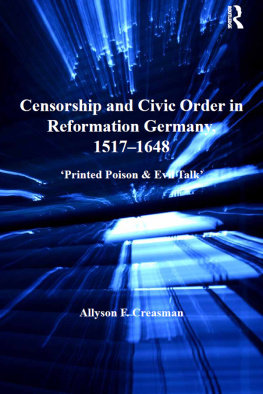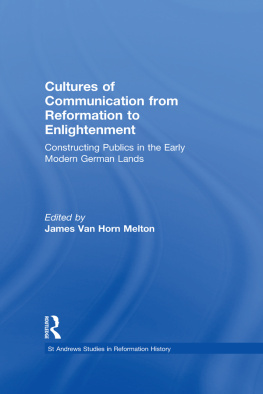First published 2012 by Ashgate Publishing
Published 2016 by Routledge
2 Park Square, Milton Park, Abingdon, Oxon OX14 4RN
711 Third Avenue, New York, NY 10017, USA
Routledge is an imprint of the Taylor & Francis Group, an informa business
Copyright Allyson F. Creasman 2012
Allyson F. Creasman has asserted her moral right under the Copyright, Designs and Patents Act, 1988, to be identified as the author of this work.
All rights reserved. No part of this book may be reprinted or reproduced or utilised in any form or by any electronic, mechanical, or other means, now known or hereafter invented, including photocopying and recording, or in any information storage or retrieval system, without permission in writing from the publishers.
Notices:
Product or corporate names may be trademarks or registered trademarks, and are used only for identification and explanation without intent to infringe.
British Library Cataloguing in Publication Data
Creasman, Allyson F.
Censorship and civic order in Reformation Germany, 1517-1648 : printed poison & evil talk. (St Andrews studies in Reformation history) 1. ReformationGermany. 2. Religious literatureCensorshipGermanyHistory16th century. 3. Religious literatureCensorshipGermanyHistory17th century. 4. Freedom of informationGermanyHistory16th century. 5. Freedom of informationGermanyHistory17th century. 6. GermanyChurch history16th century. 7. GermanyChurch history17th century.
I. Title II. Series
323.44094309031-dc23
Library of Congress Cataloging-in-Publication Data
Creasman, Allyson F.
Censorship and civic order in Reformation Germany, 1517-1648 : printed poison & evil talk / Allyson F. Creasman.
pages cm. (St. Andrews studies in Reformation history)
Includes bibliographical references and index.
ISBN 978-1-4094-1001-0
1. CensorshipGermanyHistory16th century. 2. CensorshipGermanyHistory17th century. 3. ReformationGermany. I. Title.
Z658.G3C74 2012
363.31dc23
2012006244
ISBN 9781409410010 (hbk)
Acknowledgments
In the writing of this book, I have benefitted from the help and generosity of a great many people. Above all, I am grateful to H. C. Erik Midelfort, my doctoral advisor at the University of Virginia, who guided me in this project from its earliest stages. I am also indebted to Anne J. Schutte and Duane Osheim for their invaluable comments, critiques, and questions at the outset of this project. While in Augsburg, I was tremendously fortunate to find myself working among an extremely supportive circle of scholars. For their encouragement, advice, and ready friendship, I am deeply grateful to Duane Corpis, Susanne Eser, Georg Feuerer, Alexander Fisher, Helmut Graser, Emily and Austin Gray, Mitch Hammond, Michele Zelinsky Hanson, Bridget Heal, Carl Hoffman, Christine Johnson, Hans-Jrg Knast, Benedikt Mauer, Wolfgang Mayer, Beth Plummer, Kathy Stuart, Ann Tlusty, and Helmut Zh. I am particularly indebted to Hans-Jrg Knast who, in addition to being a friend and neighbor, shared with me his (seemingly limitless) knowledge of all things related to printing in early modern Augsburg. My fellow Virginian, Mitch Hammond, helped me learn how to read early modern script, and my fellow laborers in the Urgichten, Ann Tlusty, Michele Zelinsky Hanson, and Kathy Stuart, schooled me in the workings of the criminal element in early modern Germany.
The research for this study would not have been possible without the financial support of the German-American Fulbright Commission. I am also grateful for support from the University of Virginia Society of Fellows, Davidson College, Sewanee: The University of the South, and Carnegie Mellon University. For their assistance with my research, I wish to express my thanks to the staff at the Augsburg Staats- und Stadtbibliothek and the Augsburg Stadtarchiv, the Nrnberg Staatsarchiv, the Stadtarchiv Ulm, the Frankfurt Institut fr Stadtgeschichte, the Bayerisches Hauptstaatsarchiv, the British Library, and the Herzog August Bibliothek in Wlfenbttel. I owe special thanks to Alois Senser at the Augsburg Stadtarchiv for his help with my research. At the Universitt Augsburg, I wish to thank Professors Johannes Burkhardt and Rolf Kieling for assisting with my project.
At Ashgate, I owe particular thanks to Andrew Pettegree, series editor of the St Andrews Studies in Reformation History, for his support of my project. I also wish to thank the readers and editors who helped turn this into a better book.
I am deeply indebted to the many friends I made in Germany for their support during my research. Above all, I wish to thank Gerburg and Lothar Wolf, who essentially adopted me in Augsburg. They took me in, improved my German, showed me around, took care of me when I was in the hospital, kept me entertained, and saw to it that I ate very well. Their help to me has been invaluable, and I cannot express my thanks enough. For their friendship and support in Germany, I am also deeply grateful to Barbara Hunter and her family, Alena Schfer, and Ursula Hell. I also owe special thanks to the Augsburg Fulbright representatives, Eleanor and Joachim Hermann, and to their son David, for all their help during my stay there.
For their friendship, encouragement, and good humor through the early stages of this project, I thank my friends and colleagues at Virginia, particularly Taylor Fain, Robert Ingram, Krister Johnson, Susan Maxwell, James Owens, and Scott Taylor. I also owe thanks to Eric and Tania Mings, Madeline Gutierrez, Dan Lewbel, and Mary Doty Solik for their help stateside while I was abroad. At Carnegie Mellon, Im grateful to my colleagues Kate Lynch, Donna Harsch, and Wendy Goldman for their help and advice on turning this into a book. Lisa Tetrault was great company as we were stuck in the library revising our respective manuscripts on many a summers day.
Portions of this book have been published previously in Side-Stepping the Censor: the Clandestine Trade in Prohibited Texts in Early Modern Augsburg, in Shell Games: Studies in Scams, Frauds and Deceits (13001650), eds Mark Crane, Richard Raiswell, and Margaret Reeves (Toronto: Centre for Reformation and Renaissance Studies, 2004), 21137, and in Lies as Truth: Policing Print and Oral Culture in the Early Modern City, in Ideas and Cultural Margins in Early Modern Germany, eds Marjorie E. Plummer and Robin Barnes (Aldershot: Ashgate, 2009). I am grateful to those presses for their kind permission to re-publish this material.





